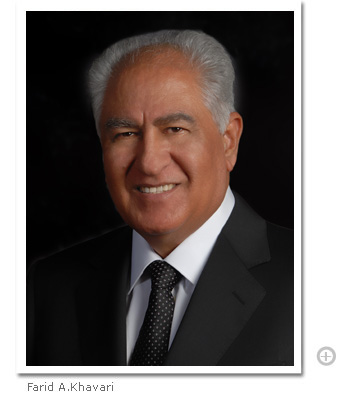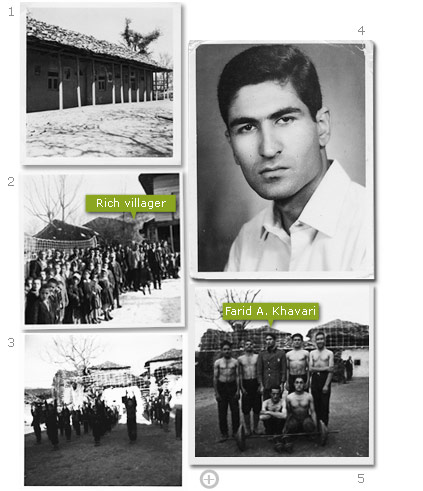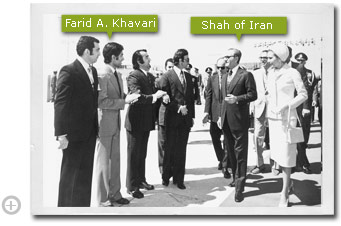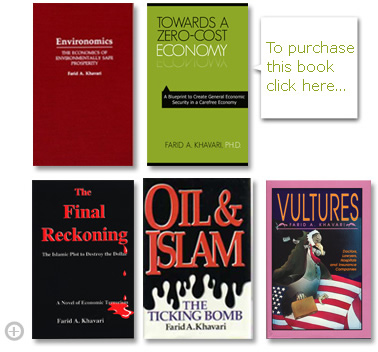
Many factors besides education and experience shape a person. Below are the factors that I believe have shaped me.
|
| Name |
| Farid Akhtarekhavari (shortened to Farid A. Khavari) |
| Date of birth |
| February 25, 1943 |
| Place or birth |
| Yazd, Iran |
| Family |
| My beautiful and loving wife, Janilla, and our two wonderful children, Armin and Bianca |
| Places of residence |
Iran, 1943 to 1945
India, 1946 to 1954
Iran, 1954 to 1964
Germany, 1964 to 1977
United States, 1977 to present |
|
|
 |
| Education |
• Doctorate in Economics, University of Bremen, Germany, 1976.
Thesis: The Pricing of OPEC Crude Oil – An Analysis of the Determinants
• Masters Degree in Economics, University of Hamburg, Germany, 1976
Thesis: The Interdependence of the Oil-Producing and Oil-Consuming Nations
|
| Languages spoken |
English, German, Farsi and Dari (the old Iranian language spoken by the Zoroastrians).
|
| Religious background |
My ancestors descended from Zoroastrians, who practiced the first religion of Iran. Zoroastrian principles are good words, good thoughts, and good deeds; it's a very peaceful religion.
Later, my great-grandfather converted to Bahá'i, a socially advanced and peaceful religion. For me, the most striking principles of the Bahá'i Faith are:
• Elimination of all prejudice
• Equality between men and women
• Elimination of extreme poverty and extreme wealth
• Universal education.
|
| Personal tragedies & unbreakable beliefs |
In 1980, a year after the Iranian revolution, the Islamic Republic of Iran executed my father for refusing to renounce his faith. (A prominent Bahá'i, my father had pioneered to India, where he created the largest Bahá'i community in the world. He was instrumental in purchasing land for the beautiful temple in Bahapur, a New Delhi suburb, which is now the site of the Lotus Temple, one of two attractions featured in India's Ministry of Tourism TV advertising in the United States.) A few weeks after my father's execution, Islamic Republic officials demanded that my mother pay for the bullets used to execute him and that she renounce her faith in order to stay in her house. She paid for the bullets and simply walked out of the house, telling them, “You can have it.” A few months later, she joined me in Miami, Florida, where she lived until she passed away in June 1994.
My beloved late wife, Louise, suffered an untimely and tragic death after being injured in a car accident and ultimately killed by medical malpractice in Miami, Florida in 1978.
|
| Education corps in Iran |
| |
 |
During the rule of the Shah of Iran, I was among the first to join the Iran Education Corps, teaching reading, writing, and arithmetic to children and adults in a village in northern Iran from 1962 to 1964. At age 19, as a high school graduate, I accomplished the following:
 |
Taught 60 children and adults
|
 |
Built a four-classroom school with the help of villagers
|
 |
Built a public bath area for villagers' use
|
 |
Created a volleyball court for villagers' use
|
 |
Bought a set of barbells and dumbbells with my first paycheck and donated them to the villagers for bodybuilding, out of gratefulness to Chuck Sipes, the greatest American bodybuilding champion of the 1960s, who'd made me happy by sending me his bodybuilding course. (See “Influences” below.)
|
 |
Outlawed the extortionate interest rates being imposed on villagers by a rich individual. (Villagers were required to pay 100% interest to him annually, which discouraged them from working.)
|
 |
Freed all villagers from having to pay more interest to that rich individual.
|
1- Four-classroom school that I built during my service in the Iran Education Corps.
2- Town meeting to outlaw extortionate interest rates.
3- Daily exercising for students in education corps
4- Farid A. Khavari at 20 years of age
5- Bodybuilders at the volleyball court |
|
| Meetings with world leaders |
| |
Mahatma Gandhi, spiritual and political leader. As a child, my father took me to see him in 1947. A year later (January 30, 1948), Gandhi was assassinated. My grandmother and I were among the crowd who witnessed his corpse being carried to India's Parliament.
Jawaharlal Nehru, Indian prime minister. I met him during a celebration party given by the Iranian Embassy in New Delhi in honor of Tenzing Norgay (1953), whom I met there as well.
Mohammed Reza Pahlavi, Shah of Iran (1975)
Amir Abbas Hoyveda, Prime Minister of Iran (1975)
1- Audience with His Majesty Mohammed Reza Pahlavi, the Shah of Iran (1975) |

|
|
| Influences & Inspirations |
My father, Noorullah, who set my intellectual foundation by teaching me to write in Farsi at an advanced level and by planting the idea of economic security in my mind
My mother, Banoo, who taught me not only to survive but to make the best out of difficult times, which ultimately led me to develop the concept of a zero-cost economy. Her unbending will was exemplary.
Mahatma Gandhi, the man with the most powerful words in the world
Tenzing Norgay, the famous Nepalese sherpa (mountaineer) who conquered Mt. Everest and demonstrated that anybody is capable of extraordinary performance
Robert F. Kennedy, compassionate youthful spirit. His ideas about the Gross Domestic Product were revealing and inspiring.
Martin Luther King, America's Gandhi
Malcolm X, who provided true guidance to deprived people
Anwar Sadat, who paid for friendship with his life
Mohammad Ali, a man greater than all of his boxing skills
Chuck Sipes, Mr. World 1968, the most giving person. As a 16-year-old in Iran, I wrote him a letter asking if he'd send me his bodybuilding course at no charge. (I couldn't afford to pay for it.) Chuck sent me the course immediately. His picture still hangs in my office.
Ronald Reagan, for his limitless confidence
Gerald Ford, the most decent U.S. President
Shah Reza Pahlavi of Iran, for his drive to rid Iran of backwardness and fanaticism
Mohammad Reza Shah of Iran, for modernizing Iran and being a true friend of America
|
| Books Authored |
| |
Carefreeism: Economic Security in a Carefree Economy (currently in preparation). This book is an expansion of “Towards a Zero-Cost Economy: A Blueprint to Create General Economic Security in a Carefree Economy” (available on this website as a free download).
The Final Reckoning: The Islamic Plot to Destroy the Dollar. ARFA Publishing Co., U.S.A.: 1995.
Environomics: The economics of environmentally safe prosperity. Westport, Conn., USA and London: Praeger, 1993.
Oil & Islam: The Ticking Bomb. U.S.A: Roundtable Publishing, 1990.
Vultures: Doctors, Lawyers, Hospitals and Insurance Companies: What's Wrong, and What to Do About It. U.S.A.: Roundtable Publishing, 1990.
Die OPEC im weltwirtschaftlichen Spannungsfeld – Ein Beitrag zur Discussion um die “neue Weltwirtschaftsordnung.” (OPEC and the New World Economic Order). Germany: Weltforum-Verlag, 1976.
Die Oelpreispolitik der OPEC-Laender – Grenzen, Gruende und Hintergruende. (The Oil Price Policy of the OPEC Countries: Limits, Reasons and Backgrounds). Germany: Weltforum-Verlag, 1975.
Die Oelkrisen bedrohen den Wohlstand des Westens. (The Oil Crises Threatening the Prosperity of the West). Germany, 1973 (unpublished manuscript).
Sephahe Danesh dar rahe sazendeghiye roustaha (Education Corps in Building the Villages). Iran: 1964.
|
|

|
| Journal and newspaper articles |
| |
Numerous articles in the following publications:
Brennstoffspiegel (Germany)
Development and Cooperation (Germany)
Die Welt (Germany)
Ekonomska Analiza (Yugoslavia)
Energiewirtschaftliche Tagesfragen (Germany)
|
Frankfurter Rundschau (Germany)
Internationale Entwicklung (Germany)
Handelsblatt (Germany)
Maandschrift Economie (The Netherlands)
Tehran Economist (Iran)
Miami Herald (United States)
VDI Nachrichten (Germany) |
|
| Patents |
Solar heating check valve and flow indicator; patent #4474209
Design for an orthopedic pillow; patent #D306245 |
| Television appearances |
20/20 (ABC)
Geraldo Rivera Show (NBC) |
| Radio interviews |
| Numerous interviews on radio shows throughout the United States to discuss my books |
| Honors |
| Was received by His Majesty Mohammed Reza Pahlavi, Shah of Iran, and Amir Abbas Hoyveda, Prime Minister of Iran, as one of the top Iranian students studying abroad (1975) |
| Professional experiences |
Research associate at various economic institutes
Editor of raw materials at Entwicklungspolitische Informationen
Author of numerous books and journal articles (see above list)
Research & development, manufacturing, distribution, and installation of solar energy systems. (Note: In 1985, the U.S. Department of Energy sent a high-level Chinese delegation consisting of ministers and professors to tour our solar plant, General Solar Technology, Inc. [GST] in Miami, Fla. Delegation members received a sample of all products we had developed or had in prototype, including an evacuated high-temperature solar tube. However, due to failure to extend the tax credit, solar energy in America suffered, and subsequently GST ceased to exist. In May 2008, I visited a solar energy show in San Diego that featured Chinese manufacturers of evacuated high-temperature solar tubes; no American manufacturers were present!)
Distribution of high-end audio products in Germany
Design, manufacturing, and distribution of exercise equipment and health-related products
Beauty and “alternative” medical spa for noninvasive body shaping and healthy skin. The spa served as more than a moneymaking entity. I used it to experiment with and develop the concept of productivity in the service sector as well as a theory to reach the ultimate speed of productivity. |
| Most influential event |
| The event with the most profound and lasting impact on my life was the peaceful decolonization of India from Great Britain. During this period, I was struck by the young Indian girls who stood in front of stores selling British products. When customers indicated they intended to buy British products, these girls would politely ask them to buy Indian-made products instead. If the customer still wanted the British-made item, these girls would fall on their feet and beg them not to buy it. It wasn't long before the British left India. Similarly, today we must “decolonize” America by neutralizing the greedy CEOs, schemers, and swindlers of Wall Street and replace corporate America's profit-maximizing drive with ethical profit-making, as described in “Towards a Zero-Cost Economy: A Blueprint to Create General Economic Security in a Carefree Economy.” |
|